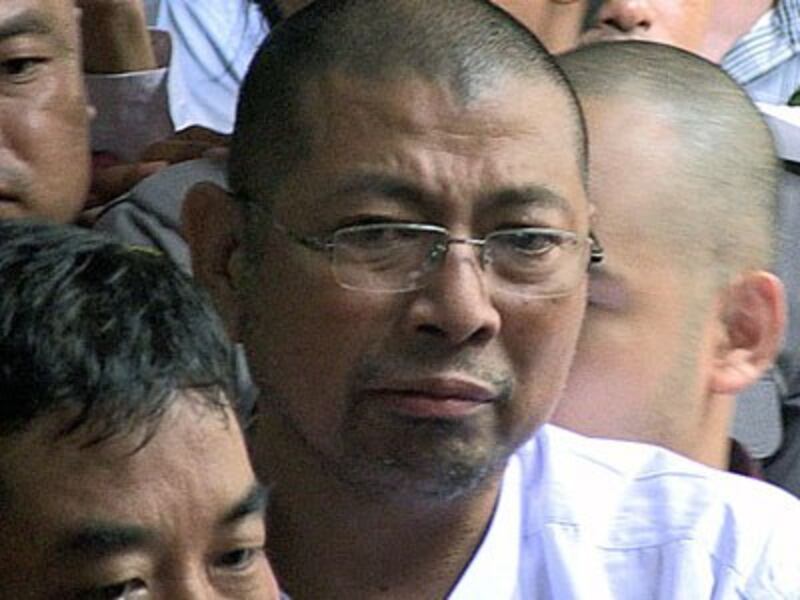Myanmar’s religious affairs minister has asked the country’s highest Buddhist regulatory council to let the government take action against wayward, unruly monks and novices in a bid to rein in clergymen who stir up trouble in the Buddhist-majority country.
On Tuesday, Aung Ko, Myanmar’s minister of religious affairs and culture, made the request at the annual meeting of the State Sangha Maha Nayaka Committee (Mahana) — the government-appointed council that oversees and regulates the country’s Buddhist clergy.
The council’s 47 senior monk members discussed matters related to religious and educational affairs at the meeting.
“Some monks and novices have been acting irreverently against the religious rules, and it is dangerous for the religion,” Aung Ko said. “That’s why I would like to ask the State Sangha council to let the government take action against them.”
Bhaddanta Kumarabhivamsa, Mahana’s chairman, also suggested that the committee’s senior monks work with local authorities to prevent groups from seeking donations from people for the construction of religious buildings.
Nearly 90 percent of Myanmar’s roughly 53 million people practice Theravada Buddhism, the more conservative of the two major traditions of the religion, making the Southeast Asian nation one of the most devout Buddhist countries in the world.
Ultranationalist monks repeatedly have used inflammatory rhetoric to incite communal hatred against the ethnic minority Rohingya, Muslim residents of Rakhine state in western Myanmar who have been the target of what international critics have called ethnic cleansing.

Parmaukkha sentenced
In a related development, a court in Yangon’s Kamayut township on Wednesday sentenced prominent ex-Buddhist abbot Parmaukkha to three months in jail for his role in organizing a protest against the U.S. government's use of the word "Rohingya" outside the American embassy in Yangon in April 2016 without obtaining permission from authorities.
Parmaukkha, who once belonged to the ultranationalist Association for the Protection of Race and Religion, better known as Ma Ba Tha, served a one-month sentence from a previous ruling in late 2017 for violating the Peaceful Assembly Act, but remained in detention after his term expired to be tried for incitement.
Parmaukkha left the anti-Muslim Ma Ba Tha in 2016 reportedly over political differences.
After religious authorities banned the hard-line Buddhist network in May 2017, Ma Ba Tha rebranded itself under the less controversial name Buddha Dhamma Philanthropy Foundation.
Parmaukkha, who was defrocked following his arrest in November, was sentenced on Wednesday under Section 505(b) of Myanmar’s Penal Code, which pertains to sedition, for inciting unrest during the protest.
“He served a one-month prison sentence, and he was given a total of four months,” said Parmaukkha supporter Sithu Myint. “With time served, his new jail term will expire on March 12.”
Parmaukkha's attorney, Aung Thu Rein Tun, said his client did not receive the maximum two-year sentence because the judge took into account his age and his status as a monk, the online journal The Irrawaddy reported.
The lawyer also said the lawsuit was illegitimate because the plaintiff did not sign the complaint and that Parmaukkha was countersuing two judges, two police officers, a prosecutor, and a township administrator who had endorsed it, the report said.
Anti-Muslim rhetoric
Other influential monks have been censured by religious authorities for their provocative public comments.
In March 2017, the Mahana in the central Myanmar town of Mandalay prohibited firebrand monk Wirathu, who was associated with Ma Ba Tha, from giving sermons because of his repeated hate speech and anti-Muslim rhetoric.
Myanmar considers the Rohingya, most of whom live in Rakhine state, to be illegal immigrants from Bangladesh and has subjected them to systematic discrimination.
A military crackdown that began in August 2017 in northern Rakhine has driven close to 700,000 Rohingya across the border to Bangladesh, where they are living in sprawling displacement camps.
Refugees and rights groups have presented evidence that Myanmar soldiers carried out a brutal widespread campaign of killings, torture, rape, and arson in Rohingya communities, though the Myanmar government has denied the accusations.
Reported by Htet Arkar and Thiri Min Zin for RFA’s Myanmar Service. Translated by Khet Mar. Written in English by Roseanne Gerin.
